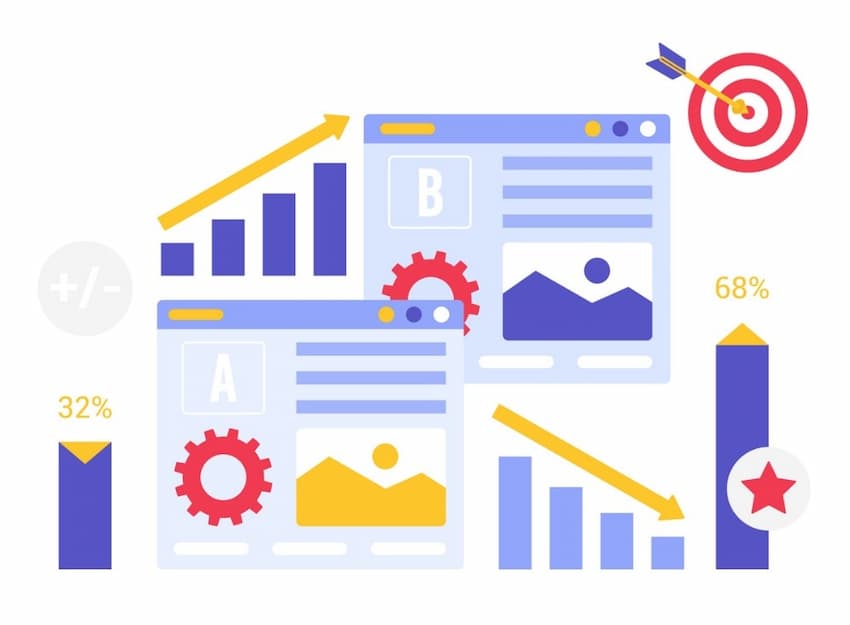 PPC campaigns can overwhelm many business owners and even seasoned digital marketers. It’s easy to make mistakes or miss valuable steps. Unfortunately, these mistakes will hinder the success of your campaign and prevent you from achieving the best results and getting the most from your budget.
PPC campaigns can overwhelm many business owners and even seasoned digital marketers. It’s easy to make mistakes or miss valuable steps. Unfortunately, these mistakes will hinder the success of your campaign and prevent you from achieving the best results and getting the most from your budget.
- Mistake #1: Poor Keyword Targeting
- Mistake #2: Lack of Clear Goals
- Mistake #3: Failing to Craft Ad Copy
- Mistake #4: Ignoring Conversion Tracking
- Mistake #5: Neglecting Testing and Optimisation
- Take Your PPC Campaigns to the Next Level
As a digital marketing agency with over 20 years of experience, we’ve refined our PPC campaigns to get the best results for our clients. To help you build the same streamlined and effective campaigns, we’ll cover the five most common pitfalls and provide practical solutions to get the most from your PPC campaigns.
Why Are PPC Campaigns So Important in Digital Marketing?
Before digging into the most common mistakes you can make when planning a PPC campaign, it’s worth taking some time to explain the importance of PPC campaigns in the first place. After all, only when you see the bigger picture can you fully understand when or what mistake was made.
So, let’s start by saying that PPC campaigns are an incredibly important part of digital marketing. They offer businesses a dynamic means to increase online visibility and achieve strategic marketing goals. Unlike organic methods that take time to deliver results, PPC campaigns offer an immediate avenue for businesses to appear at the top of search engine results pages (SERPs), which translates into fast exposure to potential customers. This instant visibility is particularly beneficial for new businesses or those promoting time-sensitive offers so they can quickly connect with their target audience.
Another plus is that PPC campaigns give businesses the opportunity to exercise precise control over their advertising budget. Advertisers can set their bid amounts and daily spending limits, which is a flexible and scalable approach to online advertising. The pay-per-click model is particularly valuable because companies only pay when users click on their ads, making it a cost-effective method with measurable returns on investment. Thanks to the ability to target specific demographics, track and measure results, and continuously optimise campaigns based on performance metrics, it’s easy to understand how PPC campaigns are seen as an excellent tool for businesses looking to grow their brand awareness, drive targeted traffic, and achieve a measurable impact.
Now that we’ve outlined the reasons why PPC campaigns are so central to digital marketing, we can analyse the most common mistakes people make when planning them and offer our solutions to solve them.
Mistake #1: Poor Keyword Targeting
Targeting and understanding the exact audience you’re trying to connect with are two key aspects of any successful paid ads campaign. By targeting keywords that have high intent and relevancy to your campaigns, you maximise your conversion chance and increase your focus on users who are most likely to engage with your content. We could then sum up the most frequent keyword mistakes as follows:
- When the keyword choice is too broad, you run the risk of appearing for less relevant search terms, wasting the budget on low-intent clicks.
- Failure to use negative keywords for the exclusion of irrelevant search terms leads to a lack of clarity in informing bidding strategies.
- Misinterpreting or underutilising data for improving targeting strategies can make the PPC campaign unsuccessful.
These mistakes result in a waste of resources through irrelevant impressions and poor click-through rates, leading to missed opportunities to engage with potential customers reducing your return on investment.
Tips to Improve Targeting
As experts in PPC campaigns, here are a few tips we want to share to help you improve your targeting and avoid the mistakes mentioned above.
- Know how your customer searches: identify key user searches, focus spending, and campaign messaging to make sure your ads show for the most common high-traffic terms.
- Segment your match types: use Phrase, Exact, and Broad Match keywords to build a bigger picture of search behaviour and control spending on more specific messaging. A good mix of match types will provide the most focused targeting approach.
- Leverage data and insights: use the data from current and previous campaigns to understand audience behaviour and preferences. Insightful data helps refine your targeting strategy, delivering optimal results.

Mistake #2: Lack of Clear Goals
The success of any paid media campaign begins with setting clear, precise goals which serve multiple purposes: they provide a strategic roadmap for setting up your campaign’s objectives and tactics, steer the decision-making process, and act as benchmarks against which you can measure campaign progress and overall success.
Businesses often set overly ambitious or vague goals, such as “increasing brand awareness” or “gaining traffic,” lacking precise metrics or timelines. Alternatively, they may set unrealistic targets without considering practicality or available resources, ultimately resulting in unsatisfactory outcomes. Implementing the SMART framework — Specific, Measurable, Attainable, Relevant, and Time-bound — can significantly improve your campaigns.
- Specific goals eliminate vagueness.
- Measurable goals allow for monitoring progress.
- Attainable goals keep the team motivated.
- Relevant goals ensure the efforts align with broader business objectives.
- Time-bound goals instil a sense of urgency and discipline.
This approach provides clarity, focus, and direction, improving the overall effectiveness and profitability of your PPC campaigns.
Mistake #3: Failing to Craft Ad Copy
Featuring persuasive, original, effective ad copy in your PPC ads will boost click-through rates, increase conversions, and capture attention. Paid ad campaigns must resonate with your audience, stand out, and achieve the desired outcome. Common errors in ad copy include failing to craft a compelling call-to-action, neglecting the use of target keywords, and creating generic content that does not resonate with the specific audience.
Overlooking the importance of creating ad copy that aligns with the particular platform used or disregarding the character limit guidelines is also a typical mistake. Be mindful of these oversights, as they could greatly influence the effectiveness of your campaign.
Here are a few tips for writing on-point ad copy:
- Include relevant keywords: use searchable keywords to improve your ad’s visibility and relevance to user search.
- Create strong calls to action: guide your audience towards a desired action with a concise and persuasive call to action.
- Make it engaging: use powerful words and great narratives to make your ad copy more engaging.
- Test and optimise: implement A/B testing and continuously optimise your ad copy based on data-driven insights.
- Know your character limit: understand the platform’s limitations and keep within these limits.
We recognise that coming up with good ad copy for your business can be challenging, especially when Google only provides a 30-character limit for headlines and 90 characters for descriptions. However, many AI tools online can help you create great ad copy within the limits of various platforms. Alternatively, you could always consider using us as your trusted content writing agency to write excellent ad copy!
Mistake #4: Ignoring Conversion Tracking
Conversion tracking is an essential tool for evaluating the success of paid media campaigns, whether it’s your social media ads or within your PPC management. Without this important metric, it’s much like navigating in the dark. Setting up correct tracking measures using Google Tag Manager (GTM) and other data collection sources can make a huge difference when it comes to insightful data analysis and strategic decision-making.
GTM allows you to implement tracking measures within your site without worrying about accessing the website’s complex structure in detail. From there, you can track individual events, which can be imported to Google Analytics for monitoring and reporting.
Tools such as GTM and Google Analytics provide excellent insights needed to fine-tune your website and ads, leading to better results from your digital marketing efforts. By keeping track of data trends and adjusting your strategies, you can avoid common mistakes and successfully improve conversion rates.
Mistake #5: Neglecting Testing and Optimisation
Constant testing and optimisation are key elements for improving the effectiveness of campaigns so that your marketing strategies connect with the target audience. When you overlook these two aspects, you can end up with stagnant campaigns, unoptimised marketing strategies, and an inability to identify weaknesses or growth opportunities. A mistake we often see is the assumption that one-time testing is enough, but the reality is very different. Success depends on continuous monitoring and analysis, updating, and amending strategies accordingly. It’s a constant “work in progress” that requires attention and skill. An approach to optimisation that solely concentrates on the most evident metrics can overlook potential areas for improvement.
Tips for Ongoing Testing and Optimisation
- Start small: begin by changing a single variable at a time, for example, a headline or a call-to-action, and compare the results to establish the most effective element.
- Establish benchmarks: identify the key performance indicators (KPIs) relevant to your campaign goals and measure these pre- and post-optimisations to assess the impact of the changes.
- Conduct A/B or multivariate testing: conduct controlled tests that compare different versions of your ads, landing pages, or other campaign elements to ascertain the best-performing options.
- Learn from your competitors: observe your competitors’ tactics, take note of their approach, and consider adopting their successful methods while applying your unique spin.
- Continuously iterate: optimisation is an ongoing process. Keep refining and testing routinely to stay ahead in an ever-evolving digital landscape.

Take Your PPC Campaigns to the Next Level
As digital marketing experts at SQ Digital, we’re aware that successful PPC campaigns can often seem a mountain too high to climb, even for seasoned marketing specialists. If you’re a business owner or digital marketer facing challenges with your campaigns, you’re not alone.
Over the years, we’ve worked with countless clients across many sectors, guiding them towards their desired success. If you’re feeling overwhelmed or unsure, let us lend our expertise. Get in touch with our team, and let us help you optimise your ad performance.








